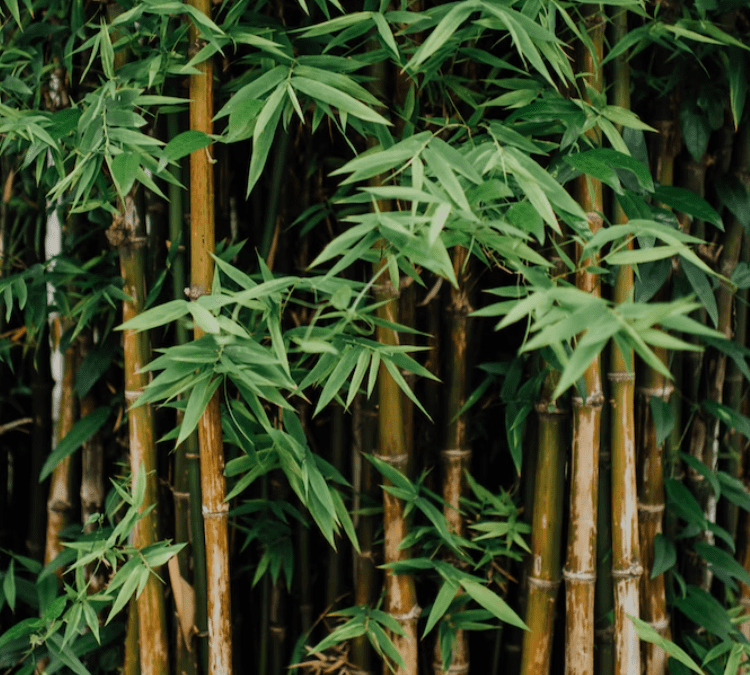Bambú
El feng shui es una filosofía china que se basa en encontrar el equilibrio y aportar energías positivas al entorno en el que vivimos. Una de ellas son las plantas, ya que nos protegen de las energías tóxicas y ayudan con el ruido, el calor excesivo o la luz. Por supuesto, el bambú es una de ellas, y una de mis favoritas. Hoy, 18 de septiembre es el día internacional del bambú, y como es una de las pocas plantas que siempre me han gustado, y su importancia en el ecosistema, vamos a hablar un poco de él.
El bambú es la planta que más rápido crece en el mundo, después del alga marina gigante del océano. También se clasifica como hierba gigante, no como árbol, debido a sus finas y pequeñas raíces. Ayuda a enfriar su entorno en 8 grados, es un aire acondicionado natural. Sólo florecen y se siembran cada 100 años, y todos los organismos de esta especie lo hacen al mismo tiempo en todo el mundo. El bambú es comestible e incluso se utiliza en algunos salteados. La dieta de un panda consiste en un 99% de bambú, unos 12-38 kg al día. Purifica el sirup a un 30% más, lo que significa que cuando estás cerca de él, recibes tanto oxígeno que te hace feliz, alivia la tensión y ayuda con los dolores de cabeza. Hay más de 1.500 especies de bambú en todo el mundo. Toleran la sequía, pero si tienen sed, enroscan sus hojas en espera de la lluvia. Algunas varas son muy fuertes y resistentes, (¡más fuertes que el acero!), utilizándose en construcciones, y las más finas se usan en jardines. El bambú es antibacteriano y desodoriza y purifica la atmósfera circundante. Sus hojas se pueden convertir en té y su sabor es muy parecido al del té verde. Puede crecer en climas cálidos o fríos, y puede ser verde, negro, marrón, dorado, azul, blanco, gris, naranja, morado, rojo, abigarrado e incluso a rayas. Y, por último, a las serpientes no les gusta el bambú, ya que es frío, resbaladizo y el mantillo es demasiado ruidoso para deslizarse por él.
Así que ahora que hemos hablado de sus beneficios, puedes ver por qué es tan importante desde el punto de vista medioambiental. Su rápido crecimiento permite plantar bosques enteros de bambú que podrían proporcionarnos un suministro interminable de madera, sustituyendo a la madera para casi todas las aplicaciones, proporciona biomasa para combustibles renovables y produce más oxígeno que los árboles. Absorben enormes cantidades de gases de efecto invernadero, emisiones de carbono, etc. Restaura terrenos degradados, produce agua para ríos y arroyos, ayudan a la conservación de especies, ya que es un hábitat para muchas plantas y animales. Y, por último, crea una nueva industria buena para los agricultores, ayuda a reducir la pobreza, a aumentar las oportunidades económicas de hombres y mujeres y a luchar contra el desempleo mundial. Así pues, el bambú no es más que una buena noticia, cuídalo, planta algunos en tu patio y aprende a apreciar esta hermosa planta.
Bamboo
Feng shui is a Chinese philosophy based on finding balance and providing positive energies to the environment we live in. One of these is plants, since they protect us from toxic energies and they help with noise, excessive heat or light. Of course, bamboo is one of them, and one of my personal favourites. Today, September 18th is international bamboo day, and since it’s one of the few plants I’ve always liked, and its importance in the ecosystem, we’re talking a bit about it.
Bamboo is the fastest growing plant in the world, after the giant sea kelp in the ocean. It also classifies as giant grass, not a tree, because of its thin small roots. It helps cool down its surroundings by 8 degrees, it is a natural air conditioning. They flower and seed only every 100 years, and every organism of this species does it at the same time all around the globe. Bamboo is edible and even used in some stir frys. A panda’s diet is 99% bamboo, about 12-38 kg per day. It purifies the sirup to 30% more, meaning that when you’re around it, you get so much oxygen it makes you happy, relieves tension and helps with headaches. There are more than 1,500 species of bamboo all around the world. They are drought tolerant, but if thirsty, they will curl up their leaves awaiting for rain. Some of the poles are very strong and sturdy, (stronger than steel!), being used in constructions, and the thin ones are used in gardens. Bamboo is antibacterial and it deodorizes and purifies the surrounding atmosphere. Its leaves can be made into tea and its taste is very similar to green tea. It can grow in hot or cold weather, and can come in green, black, brown, gold, blue, white, grey, orange, purple, red, variegated, and even striped. And finally snakes don’t like bamboo since it’s cold, slippery and the mulch is too loud to slither in.
So now that we’ve talked about its benefits, you can see why it’s so important environmentally wise. Its fast paced growth for planting whole bamboo forests that could provide us with endless supply of timber, replacing wood for almost every application, provides biomass for renewable fuels, and producing more oxygen than trees. They absorb enormous amounts of greenhouse gases, carbon emissions, etc. It restores degraded land, produces water for rivers and streams, they help species conservation, because it is a habitat for many plants and animals. And finally it creates a new industry good for farmers, helps reduce poverty, increase economic opportunities for men and women, and to fight global unemployment. So, bamboo is nothing but good news, take care of it, plant some tin your backyard and learn to appreciate this beautiful plant.

